| Srl | Item |
| 1 |
ID:
106564
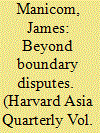

|
|
|
| 2 |
|
| 3 |
ID:
105040
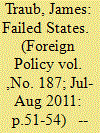

|
|
|
|
|
| Publication |
2011.
|
| Summary/Abstract |
Only some of them. It has been a truism of U.S. foreign policy since the 9/11 terrorist attacks that the United States is, in the words of President George W. Bush's 2002 National Security Strategy, "threatened less by conquering states than we are by failing ones." Defense Secretary Robert Gates has said that over the next 20 years, the gravest threats to America will come from failing states "that cannot meet the basic needs -- much less the aspirations -- of their people." Both as candidate and as president, Barack Obama has repeated this claim and has sought to reorient policy toward the prevention of state failure.
|
|
|
|
|
|
|
|
|
|
|
|
|
|
|
|
| 4 |
ID:
100570
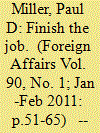

|
|
|
|
|
| Publication |
2011.
|
| Summary/Abstract |
Since 2001, Afghanistan's economy has grown at an impressive rate and major development indicators in the country have improved dramatically. Even security and the rule of law -- long neglected -- are now improving. Washington and its allies could still win in Afghanistan if they are given the time they need.
|
|
|
|
|
|
|
|
|
|
|
|
|
|
|
|
| 5 |
ID:
118202


|
|
|
| 6 |
ID:
114354
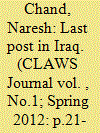

|
|
|
| 7 |
ID:
100577


|
|
|
|
|
| Publication |
2011.
|
| Summary/Abstract |
Pentagon budgets have soared over the last decade, partly because of a failure to prioritize. In the coming age of austerity, major cuts are imperative -- and if done right, they will not harm U.S. interests.
|
|
|
|
|
|
|
|
|
|
|
|
|
|
|
|
| 8 |
ID:
110156


|
|
|
|
|
| Publication |
2012.
|
| Summary/Abstract |
America's military has proven incredibly effective and adaptive to the threats of the 9/11 era. It has not, however, been particularly cost-conscious. Insolvency is our gravest national security threat, and - thankfully - the Congress has finally gotten serious about dealing with it. Defense is in for a decade of austerity, of a magnitude that cannot be accommodated within current strategy and forces. Much higher risk will need to be accepted in how we fight our wars and address threats of lesser magnitude or longer lead times unless we find more innovative approaches. Foregoing counterinsurgencies, simplifying our war aims, protecting our advantages in creativity, restructuring military benefits, shifting greater responsibility to allies and emphasizing cost-exchange ratios in our operations will be necessary. It is a daunting list, and wearying to a military that has shouldered the burdens of wars for a decade with little contribution from our broader society. But it, or something like it, will also be necessary to redress the dangerous vulnerability or our debt.
Historian Arnold Toyenbee said that empires die by suicide, not homicide. Our country has been on a path to suicide by spending profligacy and it has resulted in a debt problem of enormous magnitude. This is our main strategic vulnerability, and our capacity to solve it will likely be the crucial test of whether American hegemony is perpetuated through the twenty-first century, or we have begun to decline.
Our country is facing a margin call. We have used borrowed money to purchase assets. Those assets are both discretionary (defense and other annual spending) and non-discretionary (entitlement payments and promises). External markets and internal regulators-in the form of the American electorate-have called into question whether we have the money to pay for the assets we have purchased. Receiving a margin call, the investor must either increase the amount of money on deposit or sell off assets.
Faced with difficult choices, the United States has two enormous advantages. First, Americans have acknowledged the problem and are engaged in an extended and boisterous debate on how to solve it. Second, U.S. military dominance is so substantial that we can absorb near-term risk of significant defense spending cuts in order to solve the larger strategic problem of our national indebtedness.
The coming cuts in defense will necessitate the first serious reconsideration in the 9/11 era of the strategy and requirements for U.S. military forces. The Department of Defense (DOD) is in the process of determining where to pare for the $450 billion in cuts that constitute the first phase of the budget reductions; the more vexing question is how DOD would accommodate the additional $600-800 billion that would come with sequestration or a second phase "super committee" agreement.
To operate within the constraints of such austerity, we will have to fight differently. The size of our forces will shrink further, even though they are already too small. We will not be able to sustain personnel-intensive wars like counterinsurgencies. The operational approaches available at lesser cost have daunting endogenous effects on our military and exogenous effects on the societies in territories where we will apply military force. We will become more reliant on reconstitution, extending the timelines beyond what we have come to take for granted as immediate availability of forces and rapid execution of war plans.
We may also need to forego important recalibrations, like allowing the Marine Corps to differentiate itself from the Army and refocus on amphibious operations, and the long overdue returning of the national guard and reserve to their traditional roles. Spending in other national security agencies-on which current war strategies rely-is almost certain to be reduced even more than in DOD, calling into question our ability to conduct "whole of government" operations. These developments w
|
|
|
|
|
|
|
|
|
|
|
|
|
|
|
|
| 9 |
ID:
121920


|
|
|
| 10 |
ID:
109561
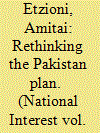

|
|
|
|
|
| Publication |
2012.
|
| Summary/Abstract |
THE QUEST for improvement in the deeply troubled relationship between the United States (along with its Western allies) and Pakistan focuses largely on Pakistan's role in Afghanistan and on the country's approach to governing. But this quest has not yielded much, and relations between Washington and Islamabad are spiraling downward. Lost in this American struggle to induce change in Pakistani behavior is a fundamental reality-namely, that there probably can't be any significant progress in improving the relationship so long as the India-Pakistan conflict persists. For Pakistanis, that conflict poses an ominous existential challenge that inevitably drives their behavior on all things, including their approach to the West and the war in Afghanistan. But if the India-Pakistan confrontation could be settled, chances for progress on other fronts would be greatly enhanced.
|
|
|
|
|
|
|
|
|
|
|
|
|
|
|
|
| 11 |
ID:
137316
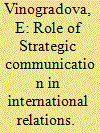

|
|
|
|
|
| Summary/Abstract |
GLOBALIZATION stands out as a major trend in today's world.* Its technological basis is the penetration of information technology into every aspect of social activity; integrating the information systems of different countries into a unified worldwide information sphere; the establishment of a common information space; the creation of global information and communication networks, and the intensive adoption of new information technologies in all areas of human activity.
|
|
|
|
|
|
|
|
|
|
|
|
|
|
|
|
| 12 |
ID:
110299


|
|
|
|
|
| Publication |
2012.
|
| Summary/Abstract |
After decades of trying, Europe still does not get the best value out of the substantial amounts it spends on defence. The experience of the past 20 years suggests that European countries will continue to need to deploy forces in a wide range of operations for a wide range of tasks. Yet defence spending is in a decline that is unlikely to be reversed unless there is a major strategic shock. These two facts suggest that Europe's armed forces will be increasingly squeezed and forced to look for new solutions. They have been under pressure for some time to deliver more effective capabilities with smaller resources, but cuts in spending necessitated by budgetary austerity suggest that these pressures could become acute. European countries can still have strong, and more effective, militaries, but to do so they must make better use of their financial resources.
It is not a matter of falling in with the desperate demand of former US Secretary of Defense Robert Gates, who in 2011 joined the long line of US officials calling for a stronger effort from Europe. It is up to European countries, not the United States, to determine themselves what capabilities they need to deal with the threats they perceive. The present security situation offers plenty of uncertainties, such as those created by the Arab Awakening in Europe's neighbourhood, but no new direct and existential threats to the security of European countries. The diffuse nature of threats in an uncertain world has contributed to a general vagueness about the purpose of maintaining armed forces: defence-policy documents developed since the Balkan conflicts have tended to be laundry lists of potentially dangerous issues with little attempt to prioritise.
|
|
|
|
|
|
|
|
|
|
|
|
|
|
|
|
| 13 |
ID:
118076


|
|
|
| 14 |
ID:
121966


|
|
|
| 15 |
ID:
107356


|
|
|
| 16 |
ID:
104209


|
|
|
| 17 |
ID:
110686
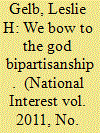

|
|
|
|
|
| Publication |
2011.
|
| Summary/Abstract |
UPON HIS departure as secretary of defense, none other than Washington's latest living legend Robert Gates cautioned those he was leaving behind to cherish and nurture bipartisanship. "When we have been successful in national security and foreign affairs, it has been because there has been bipartisan support." To drive the point home, he added: "No major international problem can be solved on one president's watch. And so, unless it has bipartisan support, unless it can be extended over a period of time, the risks of failure [are] high."
Contrary to Gates's Holy Grail sentiments and to most homilies to bipartisanship, Dean Acheson tagged the practice a "magnificent fraud." As President Truman's secretary of state and thus one of its earliest practitioners, he knew of what he spoke. In a 1971 interview at the Truman Library, Acheson offered a taste of his usual rough-and-tumble candor:
|
|
|
|
|
|
|
|
|
|
|
|
|
|
|
|
| 18 |
ID:
107595


|
|
|
|
|
| Publication |
2011.
|
| Summary/Abstract |
The United States can no longer afford a world-spanning foreign policy. Retrenchment -- cutting military spending, redefining foreign priorities, and shifting more of the defense burden to allies -- is the only sensible course. Luckily, that does not have to spell instability abroad. History shows that pausing to recharge national batteries can renew a dominant power's international legitimacy.
|
|
|
|
|
|
|
|
|
|
|
|
|
|
|
|